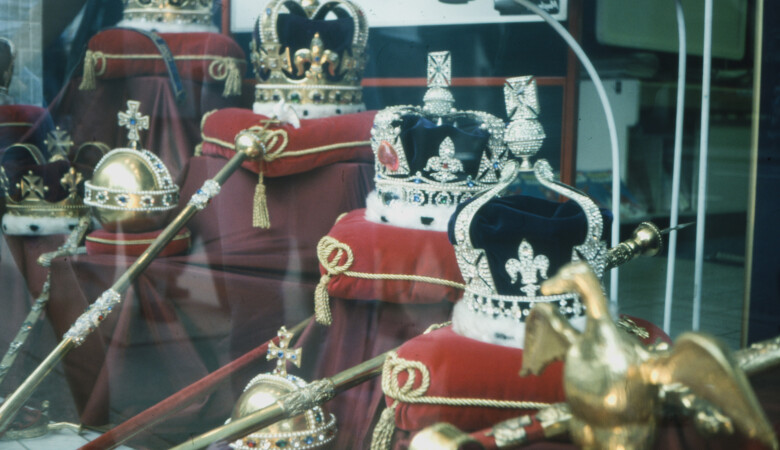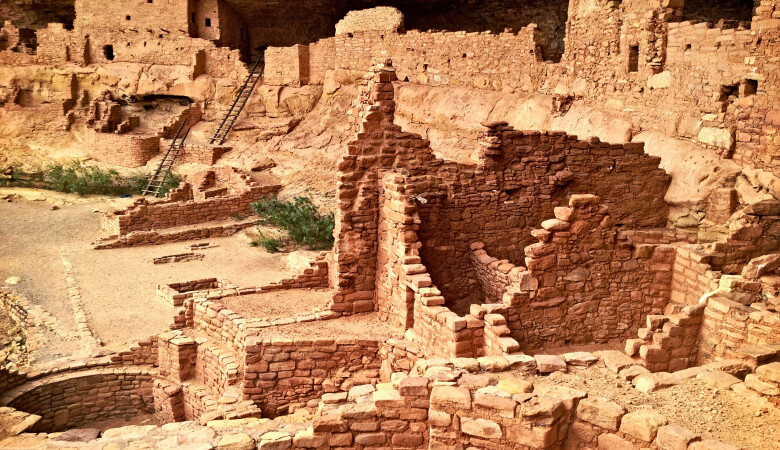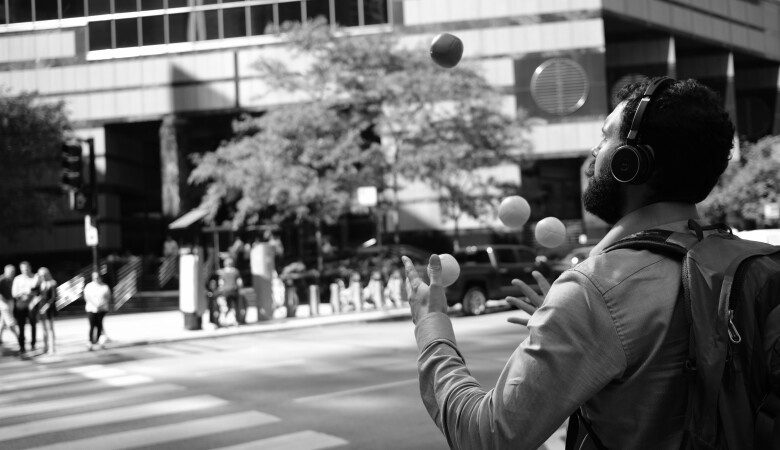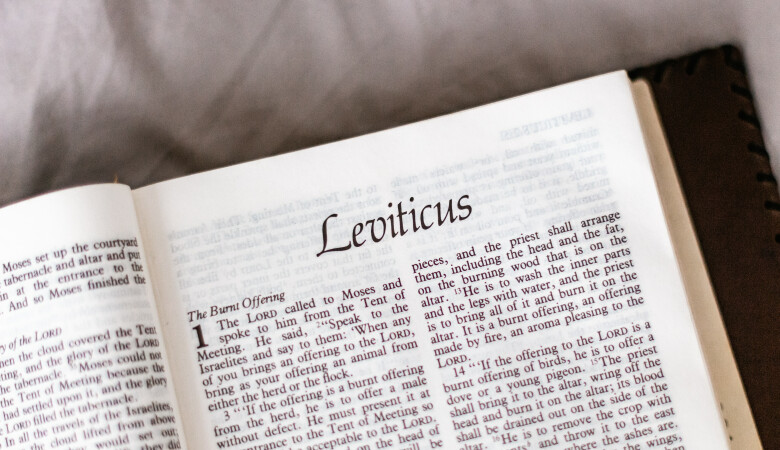Christ Our Heavenly Priest (Hebrews Sermon 30 of 74)
May 22, 2011 | Andy Davis
Hebrews 8:1-6
Prayers of Christ, Exaltation of Christ, The Offices of Christ
Seeing the High Priest by Faith
Forty days after Jesus's resurrection, he led his apostles out about a Sabbath-day walk from the City of Jerusalem, led them out into the Mount of Olives, and there he lifted up his hands and he blessed them. And after he had blessed them, he was taken up before their eyes, taken right up off the ground. He ascended higher and higher, and they stood there amazed at this. The 11 apostles as they were looking up, they saw him ascending and they stood there in wonder and amazement until finally, a cloud hid Jesus from their sight. And that began in a very significant and formal way, the church's era of faith, of trusting the ministry of Jesus by faith and not by sight. We need to believe that Jesus is our great High Priest, and the only support we have for that is the Word of God. We cannot see him ministering at the right hand of Almighty God. We walk by faith and not by sight.
Later in this Book of Hebrews, we are going to have a whole chapter extolling the virtues of faith because that really is why the Lord wanted the book written, that the faith of every generation of Christian will be strengthened, centered around the priestly ministry of Jesus, that we would see his excellence, his superiority, his perfection. That we would have a sense of the greatness of this Savior, this great High Priest, Jesus, that we would believe in him and trust in him. And so we have in Hebrews 11:1, "Faith is the assurance of things hoped for, conviction of things not seen." And we learn later by faith, Moses persevered as seeing him who is invisible, and that is Christ. And so it is that you, whatever your circumstances, whatever it is you are going through, whatever your trials, you will do the same as a Christian. You will persevere as seeing him who is invisible.
I. We Do Have Such a High Priest (vs. 1)
And so today, I want to proclaim again to you, the priestly ministry of Jesus from Hebrews 8:1-6. This is a profound theme that the author has been drawing us through now. Begin in Hebrews chapter 5, where we have the first mention of Melchizedek, how Jesus is a priest in the order of Melchizedek, and he told us at that time that he had a lot to say about this theme, and he has said it now. And this theme, he told us, was meat and not milk. It could not be accepted, it could not be absorbed by lazy listeners, he said. And he rebukes them for being such. For being lazy listeners, he rebukes them. And so we have seen the author's unfolding of this glorious theme, and today, it comes to a culmination. He will continue with elements of Jesus's priestly ministry. He'll talk more in depth about the sacrifice he offered.
And we'll get to that in chapters 9 and 10. But in terms of a concentrated meditation on Jesus as our great High Priest, it ends today. And we have here a summary, a summation of the things that he has been telling us. And I think it's very important for a good teacher of the Word of God to do this, to use illustrations, to use repetition and to use summations so that we can get the lesson. And that's what Hebrews 8:1-6 is. Now he does advance the argument. He does begin to turn a corner. And he begins in verse 6 to contemplate the New Covenant that Jesus is bringing. And the rest of Hebrews 8, it's absolutely one of my favorite sections of Hebrews 8, in which using a quotation from the Old Testament, from Jeremiah, he unfolds the greatness of the New Covenant that Jesus brings. And so, that will be next time.
But here we have a repetition and a summation of these themes of Jesus, our great High Priest. Now, for me, as a verse by verse expositor, I want to be faithful to this. I don't want to over-tax your patience with this theme, but I tell you this, I don't know that I will ever preach on this again. Specifically, this theme of Jesus as our great High Priest. It's a great theme, but it's concentrated here in Hebrews 5-7.
And now we have one more summation here in Hebrews 8:1-6. And the author takes it up by, I think, addressing an accusation that can be made against our religion. Specifically, that we have no high priest. And he asserts the point of what we were saying, the head, literally the head or the summation of what we are saying, is this. We do have such a High Priest.
The Priests and Temples of Pagan Religions and Judaism
Now the opponents of Christianity, unbelieving Jews, pagans, gentiles, they could make this accusation against our faith. You have no religion. You have no temple. You have no sacrifices. You have no idol, or a physical representation of God. You have no priest. You have nothing. Where is it, this faith of yours? I think about the pagans, for example, pagan religions. They were sensual. They assaulted the senses. You could see something, you could hear something, you could taste something. They were frequently orgies of meat that was eaten and all kinds of sensual pleasures involved. There was definitely a locus, a place of worship where you could go. Think about the Egyptians and their priests, and the way that the priest would be decked out in their priestly garb, and how their religion centered on an array of gods and goddesses.
And it was very sensual and very visual in particular. You could see it. Think about the Greeks. Think about in Ephesus, there was this incredible temple there. The Temple of Artemis of the Ephesians is one of the seven wonders of the ancient world, a magnificent structure. And people came from miles around to go worship at the Shrine of Artemis. Remember how in the Book of Acts, they're chanting for two hours, "Great is Artemis of the Ephesians." And there was in that chapter some indication that there was an image of Artemis that had fallen down from the heavens. Maybe some meteorite that looked like a person. And so they said, "This is Artemis," and they put it up as an idol. But everyone could see it. You could taste the meats that were being sacrificed. You could sensually get involved in the worship.
So it was with the Mayans and the Aztecs and religions all over the world assault the senses. They sapped the senses with input. Even that revealed religion of the Old Covenant was far more essentially appealing than the New Covenant religion. God had established a pattern of worship. And you could see the tabernacle, the tent established by the laws of Moses. Later, there was The Great Temple of Solomon, and then in Jesus's day, Herod's temple. And it was majestic and it was something to see. You remember how the apostles were just in awe of the gigantic stones that made up Herod's temple. "Look Teacher!" they said. "What massive stones, what magnificent buildings!" Jesus said, "Not one stone here will be left on another." But that Old Covenant religion did most certainly address the senses. And you could see the high priest, the ironic high priest, the Levitical priest. He was wearing robes that gave him glory and majesty. And he was doing physical sacrifices. He was offering up animals.
And that physical worship was plain to see. But what about the Christians? What about you Christians? Where is your place of worship? Where is your High Priest? Where are the sacrifices? You have none. You have no High Priest, you have no temple, you have no religion.
Even the pagans, you remember, if you've read church history, the Martyrdom of Polycarp in Smyrna, an incredible story. I commend it to you. You need to find it. Eusebius, the church historian, records it. One of the great and heroic stories in the 2nd century. Here's this godly man, Polycarp, I believe 86 years old when he was there, and he was on trial for being a Christian. He's there in the Amphitheater of Smyrna.
And they're accusing him of atheism. They called Christians the godless because they had no gods. They said that man-made gods were no gods at all, so they had no gods. And so at the pinnacle, the climax of the trial, he had to denounce Christians by saying the well-known slogan, "Away with the godless." And so what he did was, he waved his hand at all those who are persecuting and said of them, "Away with the godless." You are the true atheist. We have a High Priest. We have a God. He's in the heavens. By faith, we see Him, by faith, we receive Him. And so we sang this morning, "Open the eyes of my heart, Lord. I want to see you." I want to know by faith that you are ministering. Well, this sermon is for you. That's what the Word of God is for, to give you the eyes of faith so that you can see the truth of this statement.
A Personal High Priest
And I want you to personalize it. We Christians have such a great High Priest. I want you to get even more personal in that based on Galatians 2:20. "I have been crucified with Christ and I no longer live, but Christ lives in me, and the life I now live as a Christian, I live by faith in the Son of God who loved me and gave himself for me." So you want to say, though the text doesn't say it, but Scripture allows it. I have a great High Priest. I have such a High Priest who's gone through the heavens and He is ministering for me. The ironic high priest, the Levitical priest, wore a breast plate with the names of the 12 tribes of Israel. And they were close to his heart, and he carried their names with them into the Holy of Holies. We have even better. Jesus speaks your name personally to the Father.
He knows his sheep by name. He knows exactly what you're going through, and He is praying for you, by name. So, we have such a great High Priest, one who's priestly ministry as we've learned from Hebrews 7 has nothing to do with his genealogy, has nothing to do with who his parents were, humanly speaking. His ministry as great High Priest is in some amazing way, without beginning and without end. He is the Lamb slain from before the creation of the world. He is the one whose ministry is based on the power of an indestructible life, who ever lives to intercede for us. The one who has gone through the heavens and is now higher than the heavens, at the right hand of God, and who is ministering for us, the only begotten Son of God. This is our great High Priest. So if you take nothing away from the sermon, say this, "I have a great High Priest, and he is ministering for me."
II. Our High Priest is Seated at the Right Hand of God (vs. 1)
But he goes on and by way of repetition, some themes that we've seen before, to tell us that our High Priest is seated at the right hand of God. This is his position. He is at the right hand of God. From Hebrews 4, we learned he has passed through the heavenlies, and now he is at the right hand of God. Five times in the Book of Hebrews, we are told this. Now, in Hebrews 1:3, it's interesting the different phrases, the different combinations of phrases the author uses to say he's at the right hand of God. In Hebrews 1:3, it says, "After he had provided purification for sins, he sat down at the right hand of the Majesty in Heaven."
So there's majesty but no throne. In Hebrews 12, it says that Jesus sat down at the right hand of the throne of God. So, there is a throne mentioned there, but no majesty. But here in Hebrews 8 and verse 1, we have everything, all of it combined. "The point of what we are saying is this, we have such a High Priest who sat down at the right hand of the throne of the majesty in heaven." This is the superiority of our great High Priest, his position at the right hand of omnipotence. We cannot even begin to imagine how much power just emanates from, exudes from this throne of Almighty God. He is able to do immeasurably more than all you can ask or imagine.
He is infinitely more powerful than your mind can conceive. Daniel had a vision Of God's throne in Daniel 7:9-10. "And as I looked, thrones were set in place, and the Ancient of Days took his seat. His clothing was white as snow, the hair of His head was white like wool, and his eyes were like blazing fires, throne was flaming with fire, and its wheels were all ablaze. A river of fire was flowing, coming out from before him. Thousands upon thousands attended Him, 10,000 times 10,000 stood before Him." That is the throne of God, the throne of the majesty of heaven, and that's where Jesus is, at the right hand of all of that power. And he's there for you and for me.
And it is fitting and it's appropriate for him to be there after having been rejected by our race, rejected by humanity. Scorned, spat upon, crown of thorns, put on his head, a mocking robe put on his shoulders, beaten 'til his back was in tatters, blood flowing. Spat upon, mocked up the streets of Jerusalem, rejected by his own people. Outside the city gates, there he was crucified, he shed His blood under the wrath and curse of God, and rejected by humanity, Jew and gentile alike. He died. Philippians 2 tells us that because of this, because of his obedience, because of His godly submission to His heavenly Father, because of that, "God exalted him to the highest place and gave Him the name that is above every name, that at the name of Jesus, every knee should bow in heaven and on earth and under the earth, and every tongue confess that Jesus Christ is Lord to the glory of God, the Father."
That's where he is, that's where your great High Priest is, at the right hand of that kind of power. That's his position. Look at his posture. He's seated there. We've mentioned this before, but this is a clear and significant point. Jesus is seated there because the offering that he made is acceptable to God, and He does not need to offer another. Once for all time he has offered that offering, and so he is seated. And he has offered that offering to God and it is acceptable, and so we have a picture of Jesus having entered into that position and is seated at the right hand of God, and so that's a beautiful thing when we consider it. And we contemplated it last time, but there is an aspect of Jesus's work that is perfect and complete. It cannot be improved on. And that is His blood shed on the cross for you and me.
When Jesus died, he said in John 19, "It is finished." It is perfect, it is complete. Everything is done now, and nothing can be added to it. Nothing can be taken from it. It is perfect, and so he went through the heavens, having obtained our purification, he went through the heavens and presented it to God once for all time. And it is a perfect picture of his priestly ministry.
III. Our High Priest Serves in a Superior Tabernacle (vs. 2, 5)
We learned also, and we're going to talk about now, his ministry is also ongoing. There's a sense in which it's perfected and complete, and so He is seated at the right hand of God. But if you look at the next section in verse 2, it says that he is serving, you see, in the sanctuary, the true tabernacle set up by the Lord, not by man. Our High Priest serves in a superior tabernacle, so he is a minister.
The Greek word is leiturgos, it's from which we get liturgy. It has to do with a religious work or religious service. And so here, he is a minister. He is ministering in an ongoing sense. He is working for you and me. He is not again and again offering his blood. That doesn't need to be done, that's been done. He doesn't need to be sacrificed again and again. Once for all means once for all. He's finished, but he is ever living to intercede for you. He is ministering. And look at the location of that ministry. It says that he serves in a sanctuary, a tabernacle.
So we have two words here, sanctuary and tabernacle. The first word sanctuary in the English comes from the Latin word sanctus, which means holy. And so it's coming right up out of the Greek. He serves in the holy places, both the Holy Place and in the Most Holy Place. And so this is a picture, I think, going back to the tabernacle, which had the Holy Place and the Most Holy Place, the place where the Levitical priests worked where they offered the blood of animals, the blood of bulls and goats. And then they would go into the Most Holy Place once a year, the high priest would, and presented it. But Jesus, we are told, serves in the true tabernacle set up by the Lord, not by man.
So he serves in a tabernacle. Now, the word tabernacle literally means tent. That's literally what it is here in the Greek. Some English translations bring it over as tent. He serves in the true tent. Or I think it's best to keep it as tabernacle. But what do we mean by the word true? Well, we have to dispense with the idea of it's true versus false. The Old Covenant tabernacle was not a false tabernacle. It wasn't set up by false pretenses. It wasn't set up as a pattern of false religion, from false motives, worshipping a false God. That's not the contrast here. Rather the contrast is that which is eternal and perfect in the heavenly realms, versus that which was mere copy and shadow in the earthly realms.
I think you get the same thing in John chapter 6, when Jesus after the feeding of the 5000, you remember they come across the lake. They want to be there, and they're looking for another meal. Now friends, there's nothing wrong with looking for another meal. Some of you are going to be doing it very soon. Looking for another meal is fine, but that was not the time to be going and seeking another meal from Jesus. "Do not labor for the food that spoils but for the food that endures to eternal life, which the Son of Man will give you" and that is salvation. So they're having a discussion, and they wanted Jesus to do a sign, a wonder for them, and to give them bread from heaven like Moses did. And Jesus said this, "I tell you the truth, it is not Moses who has given you the bread from heaven, but it is my Father who gives you the true bread from heaven. For the bread of God is he who comes down from heaven and gives life to the world." Now again, the same idea. It's not like the manna wasn't nourishing. It was. It's not like it wasn't a miraculous gift of God. It was. It's not like it didn't have a benefit. It did. But in terms of redemptive history, it was a copy and a shadow of the true bread that comes down from heaven, and that is Jesus. And so Jesus serves in the true tabernacle, the one set up by the Lord and not by men.
Now, the Old Covenant tabernacle was set up by the hands of men. The commands were given in Exodus 26, that the curtains of the tabernacle were to be made of finally twisted linen of various colors and skilled craftsman were to weave pictures of cherubim in and so, it was hand-made. It was a man-made by the command of God, but it's not the true tabernacle. That was set up by men and not by the Lord. Jesus serves in the true tent that was made and not by men, but by God. Now, what is that? What is this true tabernacle? The contrast in verse 5, it says, "They serve at a sanctuary that is a copy and a shadow of what is in heaven." This is why Moses was warned when he was about to build the tabernacle, see to it that you make everything according to the pattern shown you on the mountain. And so this is how it work. Moses was up there on the mountain of God, and God commanded this man-made tent to be made and he showed him a vision of a heavenly reality, and that gave him a pattern that he was supposed to follow with the tabernacle. And He was commanded by God to be sure that he made it according to the pattern that God revealed to him on the mountain of God.
Parenthetically, I believe the same kind of thing happened with David when he had it in his heart to build the temple, which is not a movable tent but a more permanent building. Notice I said more permanent. There's nothing you can see in this life that's permanent. But that temple was meant to last longer, and he wanted to build it but God forbade him through Nathan. But God did give David a pattern or a plan for the temple revealed by the Spirit of God, which he wrote down and handed to his son, Solomon. Same kind of thing. But in Moses's case, he was shown a pattern on the mountain of God, some kind of vision of a heavenly reality. And the tabernacle is going to be a shadow or a copy, or a shadowy copy. We could put it together. That's all that the tabernacle was. The Levitical priests serve in a shadowy copy. The true tabernacle was not made by man but by God. So what is it?
What is the True Tabernacle?
What is this true tabernacle? Well, some people, some commentators have said, it's the whole universe. It's the heavens and the earth combined. That's so ethereal, I don't even know what that means. I'm just telling you what some commentators say. Others say it's the church. The church of Christ is the true tabernacle in which Jesus serves and ministers. It's getting closer, but I still don't think that's it. Some people think it's a section of heaven, like there's some kind of a heavenly tabernacle or place where Jesus as our Priest goes, a section like, I don't know, what it's cordoned off in heaven, where he goes there to plead for us and pray for us, etcetera. But I don't think that's it, either. Then what is it?
You know what I think it is? I think it is his resurrected glorified body. That's the true tabernacle set up by the Lord, not by man. It says in John 1:14, "The Word became flesh and made his dwelling [tabernacled] among us." Literally pitched his tent with us. He took up a tent and dwelt with us. Now that earthly tabernacle is a symbol of God's dwelling with His people, dwelling in the midst, dwelling with his people. Jesus taking on a body, becoming our Immanuel, our "God with us," tabernacled with us. He pitched his tent by taking on a human body, and God raised him from the dead by the power of the Spirit. And He is in that glorified resurrected body and is ascended now, and in that true tabernacle, he ministers forever.
Jesus in John chapter 2, when his Jewish opponents were challenging him and questioning him, asking what sign he could do to prove his authority to do all these things. Jesus said, "Destroy this temple, and I will raise it up in three days." They thought he was talking about Herod's temple. And they said to Jesus, "It took 46 years to build this temple. And can you raise it up in three days?" Parenthetically, do you think he could? If they turned it to rubble, do you think he could rebuild Herod's temple? Yes. Not in three days, but in three instants. Whatever he wanted to do, there's nothing he cannot do. But why would he do that? It was a shadow and a copy. The real temple was his body. And John 2:21 tells us very plainly that his body is the temple. And so it says in Revelation chapter 21, "I did not see a temple…" I didn't see one up there in the new Jerusalem, "For the Lord God Almighty and the Lamb are the temple." That's the place and so in that Jesus ministers. And so we have in Hebrews 10, a summation of all of his priestly language, etcetera.
IV. Our High Priest Offers a Superior Sacrifice (vs. 3-4)
It says, "Therefore brothers, since we have confidence to enter the most holy place by the blood of Jesus, by a new and living way opened for us through the curtain, that is, his body..." Now, I know it's a little complicated, this sentence, but I'm going to read it this way. "His body is the new and living way." He is the way in, and his body is that, the resurrected body. And so Jesus serves in a better tabernacle, amen? A superior tabernacle, a perfect one, his resurrected body. And by the way, if you're confused about this and the theology of it, Jesus has his body still. There's no confusion about this. He's still in that resurrection body, and will be forever. I'm amazed how frequently Christians stumble over this. Could you shake Jesus's hand? Could he still eat broiled fish? Could you touch him on the back? Could you put your fingers in the nail marks? Could all of that still happened? Yes, yes and yes. He's still in his resurrected body. He's still human.
He is still the Son of Man, and will be forever. And that is the true tabernacle in which he ministers as our great High Priest. And our High Priest offers a superior sacrifice. But then you already knew that, didn't you? You're here because of the blood of Jesus. And we'll talk much more about it in chapters 9 and 10, but we'll touch on it here just in verses 3-4. "Every high priest is appointed to offer both gifts and sacrifices. So it was necessary for this one also to have something to offer. If he were on earth, he would not be a priest, for there are already men who offer the gifts prescribed by the law." And so the necessity of a high priest to offer a gift and sacrifice is brought up. If you're going to be a priest, you have to offer gifts and sacrifices. Why?
Well, first, just for us as created beings who have received so much from God, so many blessings from God, even if we were not sinful, it would be appropriate for us to render to God thanks and praise for all that He's done. And so the holy angels do, and it's appropriate for there to be gifts and offerings. When God brought the Israelites into the Promised Land, He appointed that there be three times a year that the Jews would appear before God. Three times a year, and He commanded very plainly, "Not one of you is to appear before me empty-handed." Have you come here today empty-handed? I hope not. Our offerings are spiritual now, but I sure hope you brought an offering, a sacrifice of praise and thanksgiving to God for all of his goodness to you. None of us should appear before him empty-handed, just because of his goodness to us.
In Deuteronomy 16:16, He said essentially, "When the first fruits comes in the land, I want you to bring that first fruits and offer it to me. I have brought you into a land flowing with milk and honey, and you're going to eat crops you didn't plant, and you're going to live in houses you didn't build, and when that first fruit come, you come and offer that first fruit to me. Let no Israelite appear before me empty-handed." So, just because we are created and He is Creator, we should appear with gifts and sacrifices all the more in that we are sinful. We must have a sacrifice offered because of our sins. And so it is necessary for a high praise to offer a gift and sacrifice for sin. But their sacrifices are inferior. Though commanded by God they are inferior, and I say to you, they are long obsolete.
For two thousand years, they've been obsolete. Since that curtain in the temple was torn in two from top to bottom, they are obsolete. They offer the blood of bulls and goats, endlessly repeated animal sacrifices, which have no efficacy to cleanse or purify the conscience. More on that later.
Christ Offered Himself Once for All Time
But Jesus offered for all time one sacrifice, his own blood shed on the cross, and by that sacrifice, he has the power to cleanse your guilty conscience in mind. And that is the once for all perfect sacrifice. And so it is necessary for this one to have something to offer. What a grand understatement. This one, this Jesus, have something to offer, namely, his blood. And so he does offer. It is necessary for him, but is necessary for him not to offer it on Earth. Why? Because he's forbidden to do so by the law of Moses. He is of the tribe of Judah.
There were men set up by the law of Moses, Levites, who were required by law to offer those sacrifices. And so it is necessary for him not to present the blood on Earth. How beautiful is it the typology, the symbology here, the Levitical priest sacrificed the animal in one place and brought the blood to the Most Holy Place. There was a transportation of the blood, and so the altar is out there, the Most Holy Place, Holy of Holies, is in here. And so Jesus was crucified outside the city gates, under position of rejection and condemnation, and there he obtained the blood that he then moves through the heavenly realms to present to God once for all. What a perfectly fulfilled. It was necessary for that symbology to be fulfilled, and so Jesus offered the gifts, the gift and sacrifice once for all for us, a superior sacrifice.
V. Our High Priest Mediates a Superior Covenant (vs. 6)
And then finally, our High Priest mediates a superior covenant. I can't wait for the next part of this sermon series. I can't wait for Hebrews 8:7-13. What a majestic unfolding of what you get as a New Covenant believer, and how beautiful is this. But look at verse 6. "The ministry Jesus has received is as far excellent," I love the word excellent in one of the translations. Superior is fine, but just excellent. "It's much more excellent than theirs as the covenant of which He is mediator, is superior to the old one and it's founded on better promises." So we have a more excellent Priest who brings a more excellent covenant. Their covenant is obsolete. It's done, it's finished, it's been fulfilled. It's done all that it needed to do in pointing ahead to Jesus. Now, its time is finished.
But now, the author gives us a kind of a calculation, a comparison. Jesus's ministry is as superior to theirs as the covenant He brings is superior to theirs and founded on better promises. There's the calculation. And what are those better promises? Would you be offended if I told you what they were? I'll give you a foretaste. They are three.
First and foremost, "I will be their God and they will be my people." "They will all know me, from the least of them to the greatest." That is the final end, the ultimate end of what he is seeking to achieve. To reconcile us to himself, and bring us into intimate knowledge of himself. This is eternal life, that they may know you, the only true God. "They will all will know me, from the least of them to the greatest." In order to achieve that, He must take out the heart of stone and give the heart of flesh. And so He says, "I'll put my laws in their minds and write them on their hearts." And that's how they will be my people and I will be their God. And so He transforms our character so that we can actually obey his laws and love them and follow them. "For I'll forgive their wickedness and remember their sins no more."
That's the third one. These are the three things, the Old Covenant could not do. They could not bring us into a reconciled relationship with God. The blood of bulls and goats couldn't do it. It could not change our nature from stony-hearted rebels to submissive noble-hearted children, sons and daughters of the Living God. It had no power to do that. And it could not take away your sins, but only pointed ahead to someone who could. Those are the better promises. So based on that, I plead with you to trust in those promises. If you have never trusted in those promises before today, trust in them now. You have heard the Gospel today. God sent His Son, who died on the cross. His blood was shed for sinners like you and me. If you simply repent, do nothing, just in that pew seated there, look to Jesus by faith into the invisible world, look and see him ministering there, by faith, you will be saved.
Trust in Him, apart from works. Trust in Him. And if you did that years and years ago, do it again and again and again. Trust in him, trust in him, feed on Him, look to him. You have no independent salvation. You don't have any independent days. You are dependent on the ministry of your great High Priest. He is at the right hand of God and is praying for you. Feel your dependency. Look to Jesus, the author and perfecter of your faith. Trust in Him now. And celebrate the blood of the New Covenant that saves you. The night before Jesus was died, the night before Jesus died, he took the cup and he said, "This cup is the blood of the New Covenant in my blood." We're about to partake of the Lord's Supper. We're going to celebrate this New Covenant. We're going to celebrate the superior ministry of Jesus as our great High Priest. I'm going to urge you if you have trusted in Jesus as your Lord and Savior, you have publicly testified to that by water baptism, you are welcome at the table.
If you have not, we ask you to refrain. But rather just to be made right with God by simple faith. And I say this to you, and I say it to my children, you may be growing up in a Christian home, you haven't been baptized yet, but you have come to a genuine saving faith. It's just too early to recognize it yet, but you know the Lord. You can derive benefit from the Lord Supper without eating and drinking today. Look in your heart to the blood that was shed for you. Trust in that. Feed on Him by faith. I'm not saying that the eating and drinking has no value. We do it, but it's just an emblem. The real issue is your faith. So as you sit there on the pew, believe, trust. But if you are partaking, do so looking to Jesus. If you have any sin in your life, this is a great time to resolve, to dedicate yourself before God to getting rid of it. To putting it to death by the power of the Spirit. Let's pray.






























